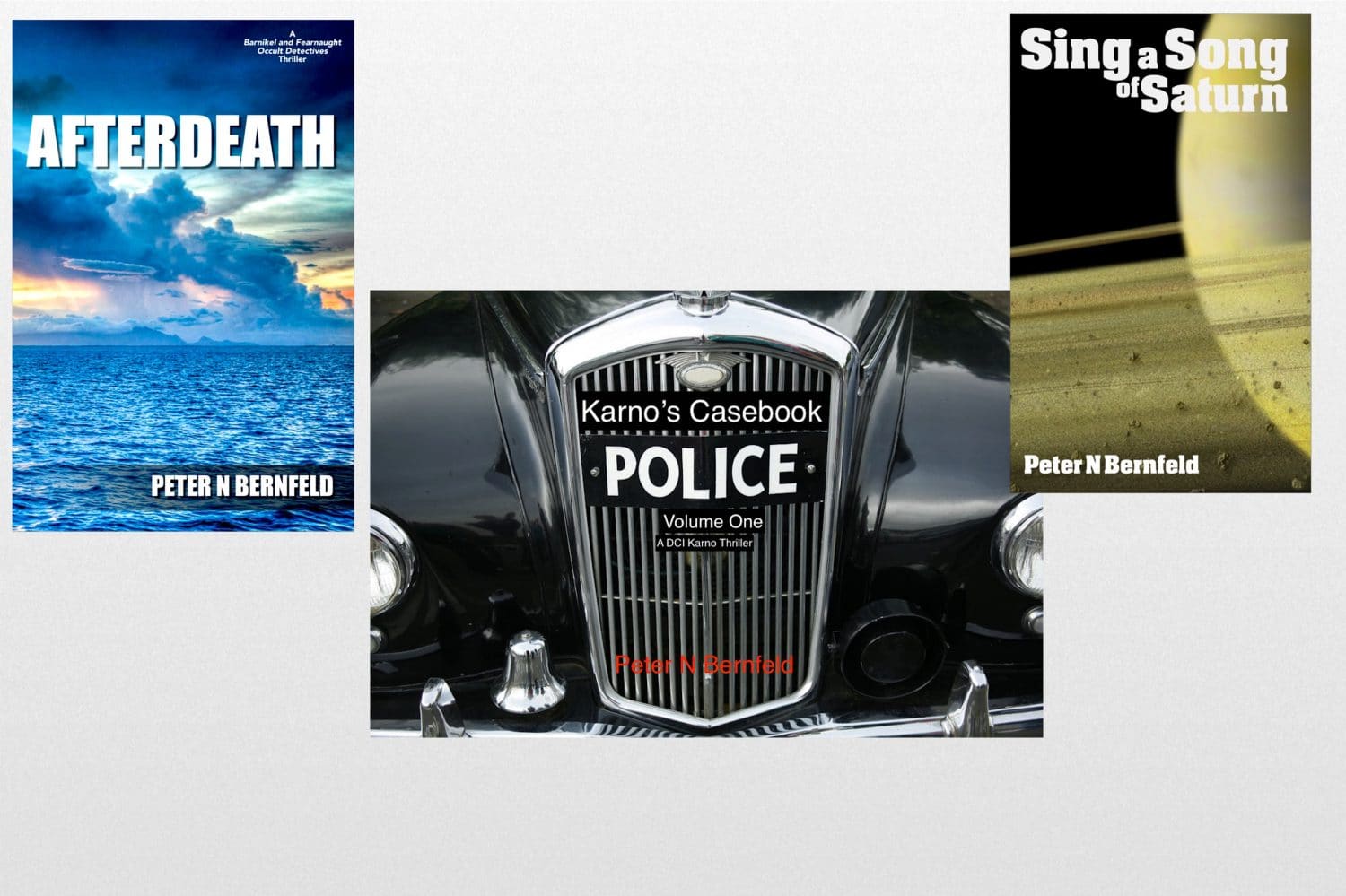
AFTERDEATH-a Barnikel and Fearnought occult detective thriller, SING A SONG OF SATURN-a collection of SF short stories,KARNO'S CASEBOOK VOLUME ONE-a collection of short police stories
No catch, No messing around

No catch, No messing around
In case you’d forgotten, Nato stands for North Atlantic Treaty Organisation. It was an exclusive club dreamed up by a group of friends–well, more or less friends–who’d stood together (most of the time) during the Second World War. Alarmed at the expansionist nature of Stalin’s Soviet Union (remember that?) they decided that united they would stand and divided they would fall. Nobody could afford to match the number of troops and tanks that the Soviet Union produced–turns out the Soviet Union couldn’t either but that’s another story–so everybody got MAD (Mutually Assured Destruction) about nuclear weapons. That kept the peace in Europe for about forty-five years and all was right with the world. Most wars during those ‘peaceful’ years were comparatively small ones and took place in far-off countries that nobody had previously heard of. They didn’t affect civilian populations, unless you count the civilian populations of the countries they took place in and those who were called-up to fight, so most people expressed their opinions of the rights and wrongs of the war and carried on with their lives.
The years passed and the Soviet Union went the way of all evil empires. Nato sort of lost it’s way. Messing around in the Balkans just wasn’t as ‘sexy’ as confronting evil Bolsheviks armed with thermonuclear devices and taxpayers throughout Europe started to get leery of stumping up millions of tax *** (insert your own currency here) for expensive new toys for the armed forces to play with. They wanted their millions of tax  *** (I.Y.O.C.H.) to buy their own toys (healthcare, better transport, pensions and other such frippery). The Americans just wanted to go home.
Politicians discovered that wars in far-off places could be vote winners and boost ailing economies. The various military organisations complained about lack of resources and some senior managers (hereafter referred to as ‘generals’) had the temerity to wonder what might happen if the Russian Federation wasn’t quite as friendly as they made out they were. The politicians responded by finding even further-off places to have wars and trusted that the voters wouldn’t notice that they were actually losing these wars. Voters already knew that they couldn’t trust politicians and now the politicians learnt that they couldn’t necessarily trust voters either. The military did what they always had done–moan about it in private (mostly) then got on with it. Whatever ‘it’ happened to be. Civilians ‘back home’ thought the military were wonderful and showed their appreciation by backing governments cost-cutting measures. In the UK that meant no more military hospitals and further budget cuts to fund nose jobs on the NHS. Seemed like a good deal at the time and anyway, we all half-remembered Rudyard Kipling’s poem about Tommy Atkins (Google it).
Enter the Crimea–or rather enter the Russian Federation into the Crimea. That briefly got everybody’s attention but–well hell–the Russkies had a point. Sevastopol was the only place to base their Baltic Fleet. It was very naughty of them to invade, particularly as they were careless enough to give away the Crimea in the first place, but what to do? Nothing really seemed best so that’s what happened. Then a civil war started in the Ukraine. What to do now? Well, hey let’s be fair about this, the Eastern Ukraine is mainly ethnic Russian so obviously what was going to happen was that Ukraine would turn into a sort of federation. Plenty to huff and puff about but nothing to get really alarmed about and it would probably turn out to be good for business. Except some places that had a sizeable number of ethnic Russians amongst their populations did start to get alarmed. Turns out that somehow these places aren’t as far-off as they used to be and some had joined the club (Nato). Then–somewhat inconveniently–it turned out that those damned Russkies might have encouraged the civil unrest in Eastern Ukraine. Much avid reading of the club rule book followed. It appeared that article five mentioned that if a member of the club was invaded then all the other members would pile in and help. People started remembering the the Rhineland, Sudetenland, Czechoslovakia, Poland and something called the Anchluss. Tables were thumped, arms twisted, hypocracy filled the air and sanctions were reluctantly agreed upon.  Germans whistled tonelessly and avoided making eye-contact with anybody.
Then it became apparent that the Russian Federation had actually invaded Ukraine. Germans stopped whistling tonelessly and narrowed their eyes. The collective penny dropped that somebody really ought to do something.  Somebody was busy so horrified Nato members realised it was going to be down to them. They straightened their backs and sucked in their stomachs. A bit middle-aged and flabby but not too bad, all things considered. Various military managers–generals–reminded the politicians that this wasn’t going to be a case of lobbing a few thousand tons of high explosives at a mainly imaginary enemy. Nato members at a long-planned meeting suddenly found that they had something to talk about. Vladi Putin had reminded everybody of the cost of freedom.
The cost of freedom? It’s two percent of GNP and we’d better damn well start paying it or we’re going to be very sorry, very soon.